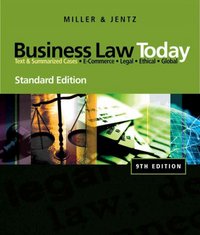Due Process. In 2006, the Russ College of Engineering and Technology of Ohio University announced that an
Question:
Due Process. In 2006, the Russ College of Engineering and Technology of Ohio University announced that an investigation had found “rampant and fl agrant plagiarism” in the theses of mechanical engineering graduate students. Faculty singled out for “ignoring their ethical responsibilities and contributing to an atmosphere of negligence toward issues of academic misconduct”
included Jay Gunasekera, professor of mechanical engineering and chair of the department. These fi ndings were publicized in a press conference. The university then prohibited Gunasekera from advising graduate students. He fi led a suit in a federal district court against Dennis Irwin, the dean of Russ College, and others, for violating his “due-process rights when they publicized accusations about his role in plagiarism by his graduate student advisees without providing him with a meaningful opportunity to clear his name” in public. Irwin asked the court to dismiss the suit. What does due process require in these circumstances? Why? [Gunasekera v. Irwin, 551 F.3d 461 (6th Cir. 2009)]
Step by Step Answer:






